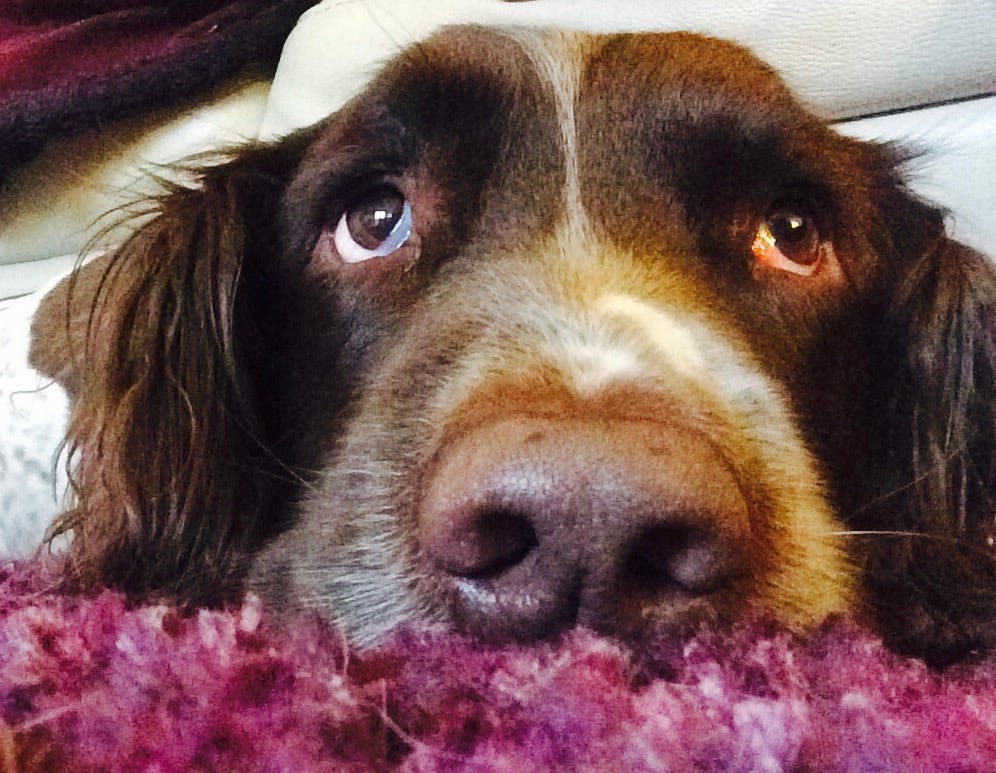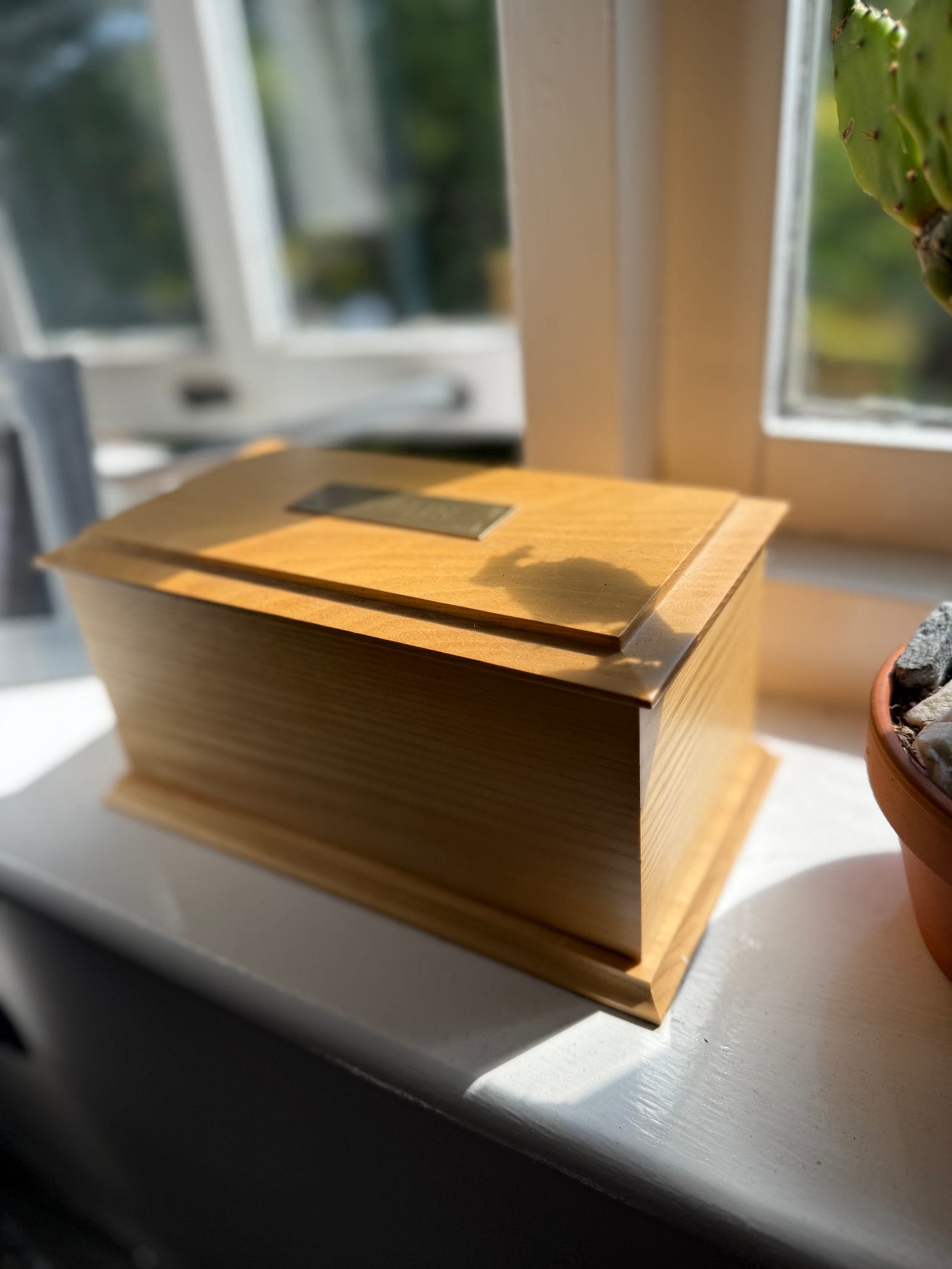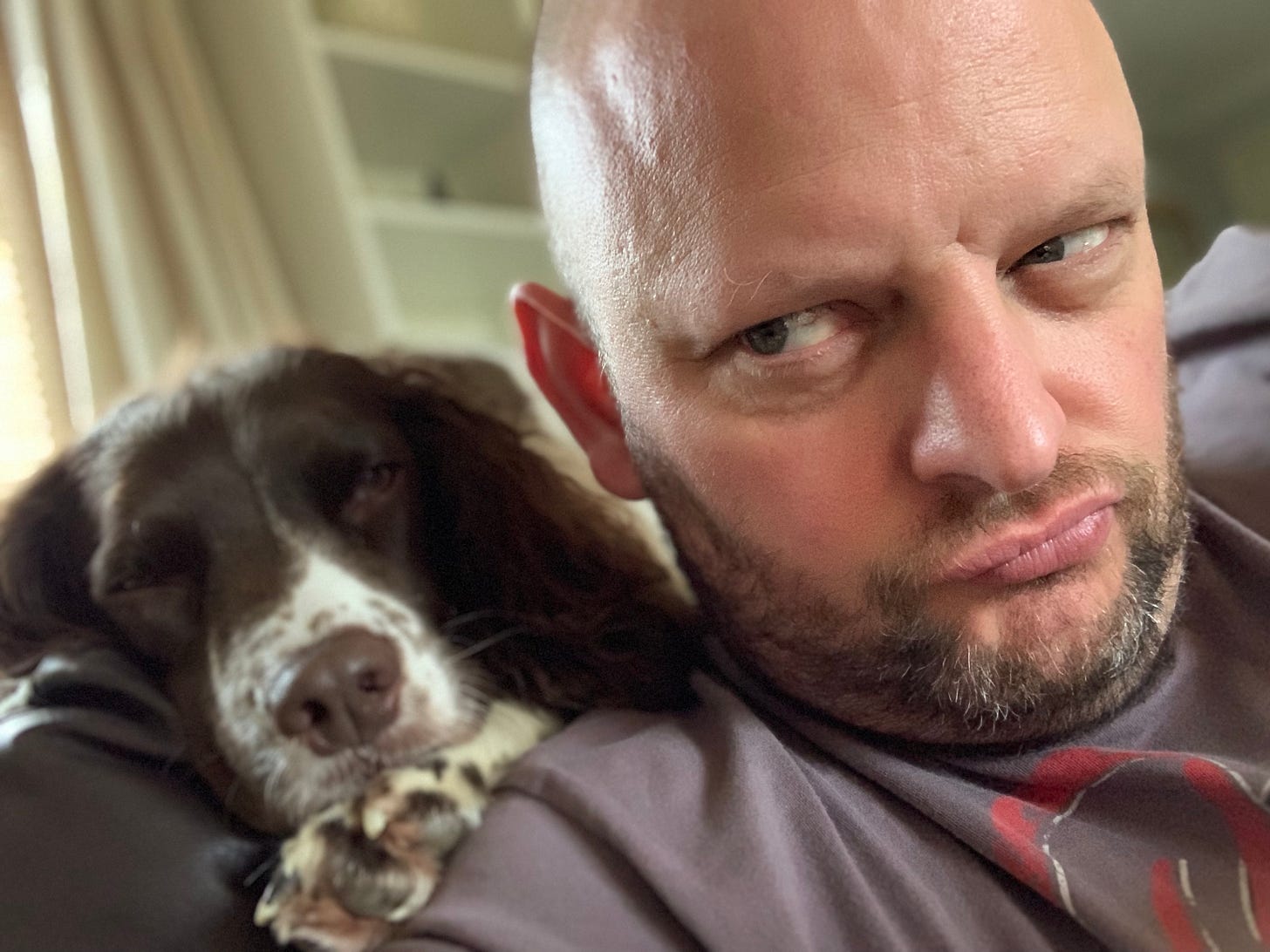A few days ago, I had a photo of Merlin, my old dog, flash on my phone. No warning, no gentle easing into the memory. Just his face, beaming up at me from the small glowing screen, and in that instant, my heart stuttered. The sense of loss was as raw as the morning he slipped from this world. His ashes rest on my window sill in the dappled shade of a huge verbena tree. I used to think keeping the ashes of your pet was peculiar, perhaps even a little desperate, but when I see that little box, he gives me a sense of peace. I feel his presence, and it warms something in me that has never really stopped aching.
Even now, years later, his absence has weight. There are days I still expect to hear the familiar shuffle of his paws or feel the quiet press of his head against my knee. His loss to my family still brings tears, made worse when I look at Bella, our twelve-year-old spaniel, who was forever changed by Merlin’s passing. Sometimes I find myself thinking about the day Bella will go too, and I feel that premature grief gather in my chest like a storm. It is too much to contemplate. Cuddling her and breathing in her scent does something inexplicable to my soul. It steadies me. It reminds me that love is worth the inevitable cost.
For a long time, I thought this was simply sentimentality. A soft-hearted weakness, the sort of feeling one learns to hide in polite company. Yet the truth, hard and gleaming as a flint, is that this grief is not small or trivial. It is biology. It is the profound rearrangement of the brain in the face of a bond severed.
Functional MRI scans have traced the terrain of this attachment with forensic precision. When you look into your dog’s eyes, your brain engages regions you might associate with human love: the ventral tegmental area, the nucleus accumbens, the amygdala. These are the same structures that light up when a mother holds her infant or a partner gazes at someone they adore. The oxytocin that floods your system during those moments surges at five times the rate evoked by most human relationships. Five times. We do not merely care for dogs. We are biologically wired to love them in a way that can feel nearly sacred.
When that presence is torn away, the withdrawal is as physiological as it is emotional. The anterior cingulate cortex becomes hyperactive, strobing with sorrow and longing. The default mode network, the part of your brain that plays memories and internal narratives, grows unstable. It replays moments you shared, looping them until you can hardly breathe. Your pulse slows. Your breath goes shallow. You feel as though some vital part of you has been hollowed out and left empty.
The most astonishing discovery is that bonds with dogs are not simply on par with bonds to humans. They surpass them in ways that are difficult to articulate without sounding sentimental. Researchers mapping attachment networks discovered that human relationships—spouses, children, parents—activate around 147 circuits in the brain. Bonds with a dog engage over 300. Three hundred and two, to be precise. Among those pathways is a hidden corridor reserved for unconditional acceptance, a place no human can reliably reach. Your dog never judged the torn wallpaper or the nights you drank too much or the mornings you could barely get out of bed. In that pure companionship, your brain found sanctuary.
This is why their absence can feel like a kind of unmaking. We live our lives in compartments, in schedules and distractions, in the hundred small ambitions that fill our days. And through all of it, the dog waits, constant and undemanding, loving us with an intensity that feels almost otherworldly. We scroll. We distract ourselves. We build walls and invent reasons to stay busy. All they have is now. Here and now, woven with patience so vast most of us will never understand it.
No one else will ever know the exact rhythm of your footsteps or the slight hitch in your breathing when you are upset. They learn every contour of your moods. Their world shrinks itself to fit around you. And in return, we often give them what is left over. Leftover time, leftover energy, and, sometimes, leftover love. It is a quiet tragedy that we rarely pause to examine. We tell ourselves we will take them on longer walks tomorrow. We will sit on the floor with them after the next deadline passes. But their time is short, and tomorrow is never promised.
If fortune is kind, they will give you twelve years, perhaps fifteen. In that small span, they offer you more loyalty than any human being is likely to give you in a lifetime. A dog loves you more than they love themselves. A dog’s life is to serve, without expectation or calculation. They love without logic, which is the purest kind of love there is. And when the end comes, they do not ask for anything. They trust us still, even as their world begins to dim. Their last breath is always for us, even if ours is not there for them. Dogs are just a chapter in your life. To them, you are the entire book.
So when people say, It was just a dog, understand that they are speaking from ignorance. Because nothing about this is just. The brain you carry in your skull has been rewired, in every shimmering synapse and circuit, to expect your dog’s presence. When that presence disappears, the neural pathways collapse and rebuild in slow, uncertain fits. This is not a flaw in your character. It is a testament to the depth of your bond. It is biology.
Over time, the mind’s quiet adaptability will do its work. New circuits will sprout where the old ones decayed. The rawness will soften, though the scar will never vanish entirely. One day you will walk past the place where their bed used to be and your chest will ache but not collapse. One day you will think of them without the taste of salt rising in your throat. But even then, some part of you will remain stitched to the memory of their steady gaze and the soft weight of their body pressed against yours.
We do not deserve something as pure as a dog. And thank God they do not know that. Because they keep loving us anyway. Even when we are selfish. Even when we are distracted. Even when we forget how little time they are given. Perhaps that is the most heartbreaking part, that their faith in us never wavers.
If you are reading this with tears in your eyes and the ghost of warm fur still clinging to your hands, know you are not alone. You are part of an unspoken fellowship of the bereft. Those who have loved and lost, who have felt the world tilt in that terrible silence, who understand that grief for a dog is real and vast and worthy of reverence.
I welcome you to share your story below. Tell us about the one who waited for you. Tell us what you loved. Let us honour the creatures who loved us without condition, who rewired our brains, and who left us better, if more broken, than we were before.
References
Nagasawa, M., Mitsui, S., En, S., Ohtani, N., Ohta, M., Sakuma, Y., Onaka, T., Mogi, K., and Kikusui, T. (2015). Oxytocin-gaze positive loop and the coevolution of human-dog bonds. Science, 348(6232), 333–336.
O’Connor, M.-F., Wellisch, D. K., Stanton, A. L., Eisenberger, N. I., Irwin, M. R., and Lieberman, M. D. (2008). Craving love? Enduring grief activates brain’s reward center. NeuroImage, 42(2), 969–972.
Archer, J. (1997). Why do people love their pets? Evolution and Human Behavior, 18(4), 237–259.

















